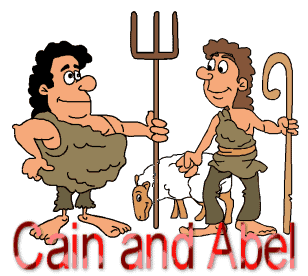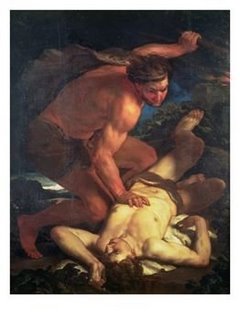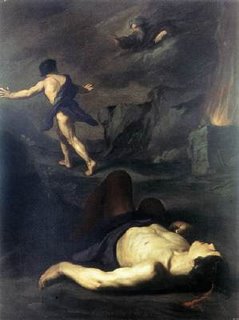All right, let's get back into this Bible thing. I've been travelling a lot, which has really cut into progress here. My apologies.
Cain and Abel
Genesis 4 is all about Cain and Abel. This is another story that everybody knows in outline. You are even now thinking to yourself, "yeah, there's Cain, and he kills his brother, and God gets angry at him." And that's exactly right. The surprising thing -- the strange thing -- is that you've pretty much got the whole story right there. That's really all there is to the story.
As the chapter starts, Eve gives birth to Cain. "With the help of the Lord I have brought forth a man," she says, in a voice no doubt dripping with irony -- it has only been nine verses since God served notice that he was going to "greatly increase your pains in childbearing." Then Abel comes along, and soon the two brothers have pursued their separate career paths, Abel in ranching and Cain in farming.
In a while, they both produce offerings to God. Abel, naturally, brings meat; Cain, veggies. God likes the meat, but did not look with favor on Cain's veggies. "Why not?" you ask. Yes, that seemed like an important point to me too. But -- and this is the strange part, to  my eyes -- no reason is given. None. The OCB, in a nice piece of understatement, notes that "this appears to be a literary gap." Yes indeed it does, and it's a gap that renders the story, however well known, to be completely meaningless for all intents and purposes.
my eyes -- no reason is given. None. The OCB, in a nice piece of understatement, notes that "this appears to be a literary gap." Yes indeed it does, and it's a gap that renders the story, however well known, to be completely meaningless for all intents and purposes.
Cain kills Abel in a fit of jealousy, God confronts Cain, Cain gets to say his money line, and then God curses him and banishes him. Adam must be pleased to see his boy take after him so closely; in my edition of the Bible, both father and son are in turn cursed and outcast on the very same page.
The OCB notes that "many themes appear in this story, including sibling rivalry, the attraction of  sin, crime met with punishment, the futility of pretense before God, and the moral distinction between civilization and barbarism." Which is all true, I suppose, but it's also giving the story much more than its literary due. These themes are evoked, but not developed, so while the story packs a certain cultural punch by virtue of being extremely well known (which is, let's face it, only because it's so close to the beginning) it doesn't really say much.
sin, crime met with punishment, the futility of pretense before God, and the moral distinction between civilization and barbarism." Which is all true, I suppose, but it's also giving the story much more than its literary due. These themes are evoked, but not developed, so while the story packs a certain cultural punch by virtue of being extremely well known (which is, let's face it, only because it's so close to the beginning) it doesn't really say much.
Begin the Begittin'
After Cain's expulsion, he, ahem, lays with his wife -- I'll avoid the obvious and age-old question of where she wandered in from -- and they begit Enoch. "Cain was then building a city," we are told, in a casual aside, "and he named it after his son Enoch." Five more generations pass without comment until we get to Lamech, who has two wives and three sons. Interesting boys, Lamech's sons: one is "the father of those who live in tents and raise livestock," one is "the father of all who play the harp and flute," and one "forged all kinds of tools out of bronze and iron." Presumably, this is a metaphorical fatherhood -- is that allowed by the fundamentalists? -- similar to calling George Washington "the father of his country" without implying that he literally, um, begat us all.
This is all readable, I suppose, as a quick-and-dirty social history of human society up through the bronze age. First there were horticulturalists and herders, and God (from the perspective of the authors) liked herders better. Then the horticulturalists built cities, horned into the ranching biz, developed a fancy urban culture, and developed protoindustries. And yeah, that's basically what really happened. Kind of interesting. I'm not sure it gets us anywhere, though.
After Lamech's five verses of fame, the story jumps back to Adam and Eve, who have a second son, Seth. It is implied that this is their third and last child, which again brings up the question of Whence the Womenfolk? -- but I promised to ignore that one.
Genesis 5
Genesis 5 starts with a very brief third statement of the creation. Then begins a series of begettings, from Adam to Seth to Enosh to Kenan, etc., etc. They all live 900 or so years, with Methuselah setting the record at a spry 969. This goes on until the introduction of Noah, father of Shem, Ham, and Japheth, at the end of the chapter.
What's up, you have to wonder, about those uberLifespans? This is explained, kinda, in the first three verses of Genesis 6: When men began to increase in number on the earth and daughters were born to them, the sons of God saw that the daughters of men were beautiful, and they married any of them they chose. Then the Lord said, "My Spirit will not contend with man forever, for he is mortal; his days will be a hundred and twenty years."
I would be curious, gentle readers, what you make of this passage. My first thought was that God is said to be cutting way back on the human lifespan as a guard against overpopulation, but that seems like a bit of a turnaround from the whole Be fruitful and increase in number; fill the earth and subdue it concept in Genesis 1. Any other thoughts? 'Cause if I only get 120 years instead of 900, I'd like to know why.
Next up: "Hey, who put the unicorns in the same berth with the tigers?" or, Lord, Here Comes the Flood.


5 comments:
hi! in an evening lull I linked off your site from the always entertaining chuckdaddy and found myself totally sucked in to your recap :) I hope you keep it up!
Meat over veggies? Well at least we know God wasn't part of the Green Party.
But seriously, is that such a literary gap? Outside of Portland, haven't humans for centuries always preferred meat over veggies? Like if me and my brother were to offer our Ukranian Grandmother food, and I offered veggies, he meat, I would totally expect to be looked down upon. Or at least have to answer to, "It isn't a meal w/o some meat!"
ChuckDaddy, you might have a point. Did you make this comment before or after you cooked that innocent little lamb?
Darci, thank you. Readers here may or may not agree on my take on the Bible, but I think that we can all agree that The ChuckDaddy Xpress is always entertaining.
The reason God liked Abels sacrifice is there in the text and it isn't meat verses veggies. Cain brought 'some of the fruits' and Abel brought 'fat portions from some of the first born.' Cain brought some of his stuff and Abel brought some of the best of his stuff. God's all about attitude.
Post a Comment